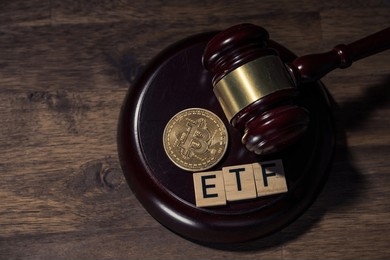In a long-awaited move, Bitcoin ETFs have finally entered the market after receiving approval from the US Securities and Exchange Commission (SEC) on January 11. However, the Commodity Futures Trading Commission (CFTC) chair, Rostin Behnam, has expressed concerns about the regulatory landscape surrounding these new index funds.
CFTC Chair Questions Suitability Of Bitcoin ETFs
In a keynote issued on Friday, Behnam emphasized that while the SEC’s approval was viewed as a significant step in developing digital asset markets, there are still several “unresolved issues” within the cash markets for digital assets.
These concerns include “opaque and inconsistent” practices related to trade settlement, conflicts of interest, data reporting, cybersecurity, customer protections, transparency, and general market integrity.
Although the Bitcoin ETFs have achieved legal certainty, allowing them to target a broader audience, Behnam underlines the lack of “concrete measures” to address these market challenges.
The CFTC chair points out that Bitcoin’s speculative and volatile nature has been wrapped in a “thin layer of indirect regulation, ” presenting the product as a “shiny” new offering. This, in turn, raises questions about its suitability for mass market participation and potential risks to market stability, according to Behnam.
Regulatory Clampdown Imminent?
Behnam explains that the barriers to effectively regulating this emerging Bitcoin ETFs market have often been rooted in fears of legitimization. He argues that legislation alone does not guarantee legitimacy, as the SEC’s decision proved.
Drawing an analogy to racing, the CFTC chair emphasizes that a license does not automatically make someone a legitimate driver; “they must demonstrate their skills and prove their worth within established parameters.”
Behnam highlights that Congress has granted no federal regulator authority over the cash markets for digital assets. Even regulated products like Bitcoin futures determine their legitimacy by market participants’ demand for the product rather than a self-certification process.
Behnam emphasizes the role of exchanges in developing and enforcing standards for derivatives products, based on their unique knowledge of the underlying marketplace and close relationships with market participants.
Behnam further stated that the absence of legislation has not impeded the enthusiasm for digital assets. However, he expresses concerns that the regulatory approval of Bitcoin ETFs may lead market participants, both retail and institutional, to mistakenly assume that these products come with comprehensive regulatory oversight in the cash commodity digital asset space.
To address these concerns and ensure the integrity of the Bitcoin ETFs market, Behnam calls for federal legislation governing cash market digital assets, emphasizing the critical need for action. Behnam concluded:
The concerns I have publicly voiced for the better part of six years regarding the digital asset commodity spot market have only become magnified. The need for federal legislation over cash market digital assets has never been more critical, and I will continue my call for action.
Following a significant period of heightened selling pressure, the largest cryptocurrency in the market experienced a sharp price correction. However, BTC has rebounded to the $41,700 level after reaching a low point of $38,500 on Tuesday.
It remains uncertain what additional measures regulators may take regarding the nascent crypto market, particularly regarding the SEC’s approval of Bitcoin ETFs.
The impact of these measures on trading and the involvement of new investors is yet to be determined, and it could have both positive and negative implications.
Featured image from Shutterstock, chart from TradingView.com







